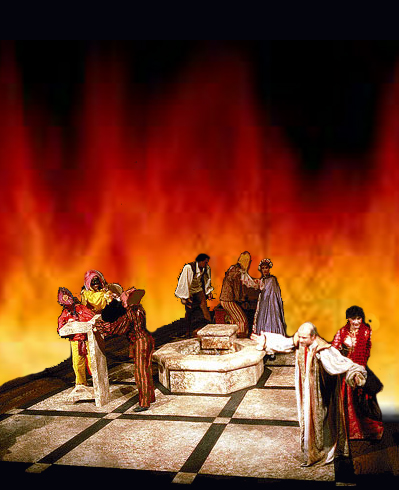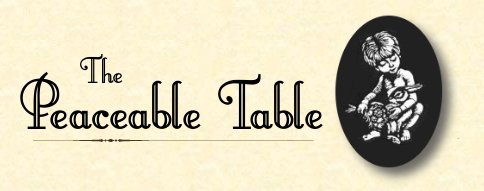Intend to Have Joy to Offer

A novel by English writer Charles Williams that I first read in the early '60s has lingered in my mind ever since. The book, Descent Into Hell, is a thriller in which a magical-spiritual reality underlies the ordinary world in a manner somewhat akin to the Harry Potter creations. A group of thespians in an artsy town called Battle Hill are having a good time preparing to stage an outdoor play. The pleasure of one of the actors, Pauline Anstruther, is disrupted when she learns that her ancestor, John Struther, was burned at the stake in the sixteenth century on the very site now occupied by their theatricals. How, she asks the playwright Peter Stanhope, can we continue to enjoy ourselves on the very place where such a horror took place?
Peter responds by first educating her as to the nature of the spiritual world: All times, and all souls, meet in an Eternal Now. Our consciousnesses are not each encapsulated in our own skins but flow together in a web of Exchange in which we telepathically share joy, can bear one another's burdens of fear or pain and thus heal one another, or inflict harm through feelings of hostility or depression. This principle of Exchange operates even across time; Pauline is to learn that a lifelong private phobia of her own stems from a direct link with the anguish of John Struther anticipating the stake. Because of this omnipresent network, none of our feelings are limited to ourselves. Therefore, Peter tells Pauline, although we should not pretend the horrors in this web are not there, we should intend to have joy to offer to those who suffer. At the climax of the story, Pauline experiences a retro-cognitive vision of her ancestor's death, and learns that by her longterm phobic terror she has taken over the agony of his fear and enabled him to die in triumphant joy.
Spiritually motivated vegetarians need not believe that the world operates in exactly the way Williams depicts it to find this story helpfully "true to life." Most people unconcernedly go about their ordinary lives, daily eating chunks of severed flesh, unaware that right beside us, hidden, so to speak, only by a fine theater scrim, are the hells of the animal death camps that provide them. Persons who find out about these facts are likely to be, like Pauline, deeply shaken and depressed, especially if their friends will not listen to them or join them in the boycott. Even if we ourselves stop financing these monstrosities, how can we continue to enjoy ourselves once we know?
Here Peter Stanhope's counsel is profoundly helpful. We do well to accept the joys, large and small, that life offers us. We should savor them, and let them help us deal with the grief, for they are not our private property; we are continually offering them to others in the web of Exchange. Our joys can help us to love both friends and opponents, and strengthen us to put our compassion to work, as can be seen in the life of Gandhi, our Pioneer for this month. After mastering the paralyzing fears of his youth, he developed a playful sense of humor that served him in good stead. At both surface and deep levels, our joys have a direct impact on all those who are involved in our lives, including many we may not know consciously. They increase the power of our prayers and meditations on behalf of the whole world, including its suffering animals.
Let us intend to have joy to offer.
 "But wasn't Hitler a vegetarian?" How many times have we
vegetarians heard this conversation-stopper from non-vegetarian
friends! This proposition is supposed to trump the argument, since
presumably no one would want to endorse a practice also followed by
the figure epitomizing all evil in the twentieth century.
"But wasn't Hitler a vegetarian?" How many times have we
vegetarians heard this conversation-stopper from non-vegetarian
friends! This proposition is supposed to trump the argument, since
presumably no one would want to endorse a practice also followed by
the figure epitomizing all evil in the twentieth century.  The photo looked completely innocuous until I looked more closely at the
picture and then read the header. There was a rope tied around the kitten's
neck, attached to a long pole lying on the ground.
The photo looked completely innocuous until I looked more closely at the
picture and then read the header. There was a rope tied around the kitten's
neck, attached to a long pole lying on the ground. The future Mahatma ("Great Soul") was born to a strictly vegetarian family
in Porbandar in the province of Gujarat, India, in 1869. His family was
Hindu, but his devout mother was much influenced by the tenets of the Jain
religion, which was prominent in Gujarat.
Jainism stresses ahimsa (non-injury to living beings), fasting for
self-purification, and tolerance between members of different sects.
The future Mahatma ("Great Soul") was born to a strictly vegetarian family
in Porbandar in the province of Gujarat, India, in 1869. His family was
Hindu, but his devout mother was much influenced by the tenets of the Jain
religion, which was prominent in Gujarat.
Jainism stresses ahimsa (non-injury to living beings), fasting for
self-purification, and tolerance between members of different sects.